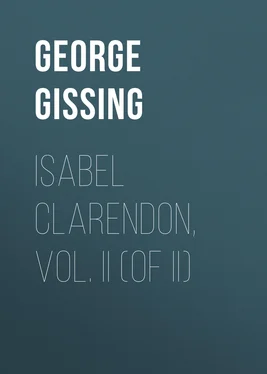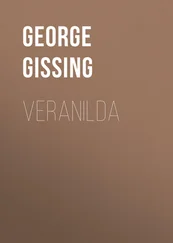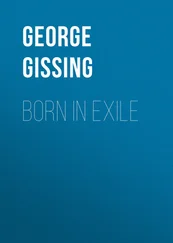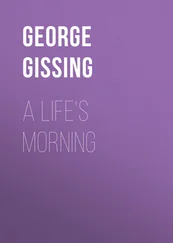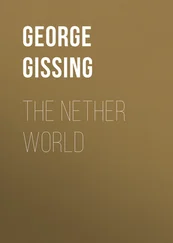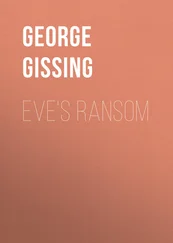George Gissing - Isabel Clarendon, Vol. II (of II)
Здесь есть возможность читать онлайн «George Gissing - Isabel Clarendon, Vol. II (of II)» — ознакомительный отрывок электронной книги совершенно бесплатно, а после прочтения отрывка купить полную версию. В некоторых случаях можно слушать аудио, скачать через торрент в формате fb2 и присутствует краткое содержание. Жанр: foreign_prose, literature_19, foreign_antique, на английском языке. Описание произведения, (предисловие) а так же отзывы посетителей доступны на портале библиотеки ЛибКат.
- Название:Isabel Clarendon, Vol. II (of II)
- Автор:
- Жанр:
- Год:неизвестен
- ISBN:нет данных
- Рейтинг книги:3 / 5. Голосов: 1
-
Избранное:Добавить в избранное
- Отзывы:
-
Ваша оценка:
- 60
- 1
- 2
- 3
- 4
- 5
Isabel Clarendon, Vol. II (of II): краткое содержание, описание и аннотация
Предлагаем к чтению аннотацию, описание, краткое содержание или предисловие (зависит от того, что написал сам автор книги «Isabel Clarendon, Vol. II (of II)»). Если вы не нашли необходимую информацию о книге — напишите в комментариях, мы постараемся отыскать её.
Isabel Clarendon, Vol. II (of II) — читать онлайн ознакомительный отрывок
Ниже представлен текст книги, разбитый по страницам. Система сохранения места последней прочитанной страницы, позволяет с удобством читать онлайн бесплатно книгу «Isabel Clarendon, Vol. II (of II)», без необходимости каждый раз заново искать на чём Вы остановились. Поставьте закладку, и сможете в любой момент перейти на страницу, на которой закончили чтение.
Интервал:
Закладка:
“I hope you have come back quite restored,” he said, rather awkwardly, when it became incumbent upon him to speak. He was not good at acting.
“Why did you fail me last night?” inquired Mr. Vissian.
“I am very sorry. I was not well,” was the brief reply.
He seated himself and was mute. Isabel kept up a lively conversation with the rector, till the latter declared he would be late for church, and hurriedly made off. When he had closed the door behind him, Isabel rose softly, her face all joy; Kingcote moved to meet her, and she fell upon his neck.
“You are not well, dear?”
“That was only an excuse. How well you look, my beautiful!”
“You are glad to see me again?”
“Glad and sorry, for I have bad news to tell you.”
“You too have bad news?” she said anxiously.
“I, too?”
“Come and sit by me.”
They sat side by side.
“Oh, let it wait!” he whispered. “Forget both yours and mine for these few moments. Look at me; let me drink at your eyes. Speak, and call me by my name. I have only lived on the echoes of that voice. Where did you learn that music, Isabel? My pure-browed lady! Your head is like those which come before us in old songs, dark against gold tapestry, or looking from high castle-windows. You should have lived when queens paced in moon-lit galleries, and heard below the poet softly singing to their beauty. Isabel! Is not that a sweet and queenly name?—and I may speak it.”
She listened, trembling with pleasure. Was not the world well lost for such worship? She all but forgot his mention of ill-hap, till the mute pain of his lips brought it back to her mind.
“What has happened, Bernard?”
“What I scarcely dare tell you. Let me kiss your lips once, and then move away and try to realise what it will be to leave you.”
“Leave me?”
“It has come at last. I have known that it must come, and yet I have closed my eyes against the certainty. I could not go to the Vissians’ last night because I was overcome with misery. In the morning I had heard from my sister that her husband is dead. She is helpless, without means of any kind, and her two children dependent upon her. I must go at once to London and—provide for them.”
“Provide for them? Has her husband left her nothing?”
“Not a coin. He was a man of business, and did badly; he has been ill for months, and they could not have lived but for money from me. It is good that he is dead. I had no more to give, unless I surrendered my independence. That of course I must do now, but for Mary and her children I can do it more easily. Her husband I disliked; association with him was impossible. He was without education, good of his kind perhaps, but—commercial. We only met once, and it was once too often.”
“But how could a sister of yours marry so?”
“Poor girl! I never understood it; but she was very young, and had known him some time. That was in Norwich, of course. She went off with him secretly, and they were married in London. Her mother would have nothing to do with them; at her death; what she would have left to Mary, came to me. It was trivial; I have more than repaid it.”
“Can his relations do nothing for her?”
“No. A brother of his, Mary tells me, has come, and will attend the funeral. But he has distinctly told her that he can give no help.”
Kingcote had drawn away a little; Isabel took and held his hand.
“Bernard, how can you support them?”
“Oh, for a time it doesn’t matter; I shall use my capital. Then I shall—work like others do, I suppose. I have had an easy life so long; it was sure to come to an end some day.”
“Why do you keep away from me? What does all this matter? Nothing has come between us, dear.”
His brows were heavy, and he could only look at her sadly. Isabel turned her head away, and dashed tears from her eyes.
“But you too have your ill news, you said?”
For answer she rose and fetched Ada’s letter. Bernard read it.
“Why ill news?” he asked, when he had brooded for a moment.
Isabel had not resumed her seat. She moved about in much agitation, and at length threw herself on her knees by him.
“It is something that I ought to have told you before,” she said. “It seemed, though, such an easy difficulty to overcome; I was so happy, and I would not think of anything in the way. I—” she hid her face against him—“I have lived beyond my income, and have had to borrow money—a large sum of money. I could not have done it, I think, unless it had seemed certain that I should marry some rich man,—though I had to insure my life, and there was my annuity. You know I have had only two thousand a year; it was so little for the way in which I lived. I have always been so thoughtless about money. I could not foresee this great happiness that has come to me. Do not think—Bernard, you won’t think that I should have ever married only because the man who asked me was rich,—I mean if I had never known you. You won’t think that? I have told you that I could never have brought myself to that. Listen, the day before my accident, before I knew that you loved me, before my own love for you had become certain in my heart, Lord Winterset asked me to be his wife, and I—I refused.”
She had looked up pleadingly, but at the end hid her face again. Oh, it is so hard to a woman—nay, that is unjust, to a man also—to speak out the whole truth in self-accusation. Who ever yet did it? What penitent at the confessional? What votary in silent prayer? Maybe it is regard for the dignity of human nature which chains the tongue, that dignity which it costs so much to support, which we so often feel to be a name only, or the shadow of a name.
Kingcote could say nothing.
“Still, listen to me, my dearest! I could not let that stand between us. The debt would have to be paid some day, and when I knew who my husband was to be, there was only one way of meeting it. I should have asked Ada,” her voice sank, “to give me the money. She will be rich, very rich; she could easily give me that. She is good-hearted, I know, though we have never been able to love each other. Before her marriage I would have asked her to give it me, and she would not have refused; it would have been her first act when the property became hers.”
He laid his hand upon her bowed head, and stroked it tenderly; then he raised her to sit by him again.
“I am so glad you have told me that,” he said, smiling very kindly. “Let it be the end of your trouble. Ada will still give you the money when she is of age.”
She kept a long silence before her next words, then looked up at him with wide eyes.
“Are we to be parted so long?”
“But our marriage as yet was in any case impossible. It was bad enough to ask you to share poverty with me; you could not support my sister and her children.”
“Would not your own income have been sufficient for them? We should have had my money.”
“Even if it were enough—barely enough—at present, it could not possibly be so as the boys grow up. It is very hard to think of her living in such a poor and joyless way in those hateful surroundings. I dread to imagine her state now. She will have grown used to a mean, sordid life; her refinement will all be gone; the poisonous air of working London will have infected her. I shall feel shame that she is my sister.”
“That will soon be altered,” Isabel said comfortingly. “You will take her into new scenes. Your society will help her. Who would not grow gentle and refined in your presence? Oh, my love, my love!”
Passionate distress overcame her; she clung to him and wept silently. Kingcote was pale-and woe-stricken; the future loomed hideous before him; he found it hard to feign to himself the gleaming of one far-off star of hope.
Читать дальшеИнтервал:
Закладка:
Похожие книги на «Isabel Clarendon, Vol. II (of II)»
Представляем Вашему вниманию похожие книги на «Isabel Clarendon, Vol. II (of II)» списком для выбора. Мы отобрали схожую по названию и смыслу литературу в надежде предоставить читателям больше вариантов отыскать новые, интересные, ещё непрочитанные произведения.
Обсуждение, отзывы о книге «Isabel Clarendon, Vol. II (of II)» и просто собственные мнения читателей. Оставьте ваши комментарии, напишите, что Вы думаете о произведении, его смысле или главных героях. Укажите что конкретно понравилось, а что нет, и почему Вы так считаете.
